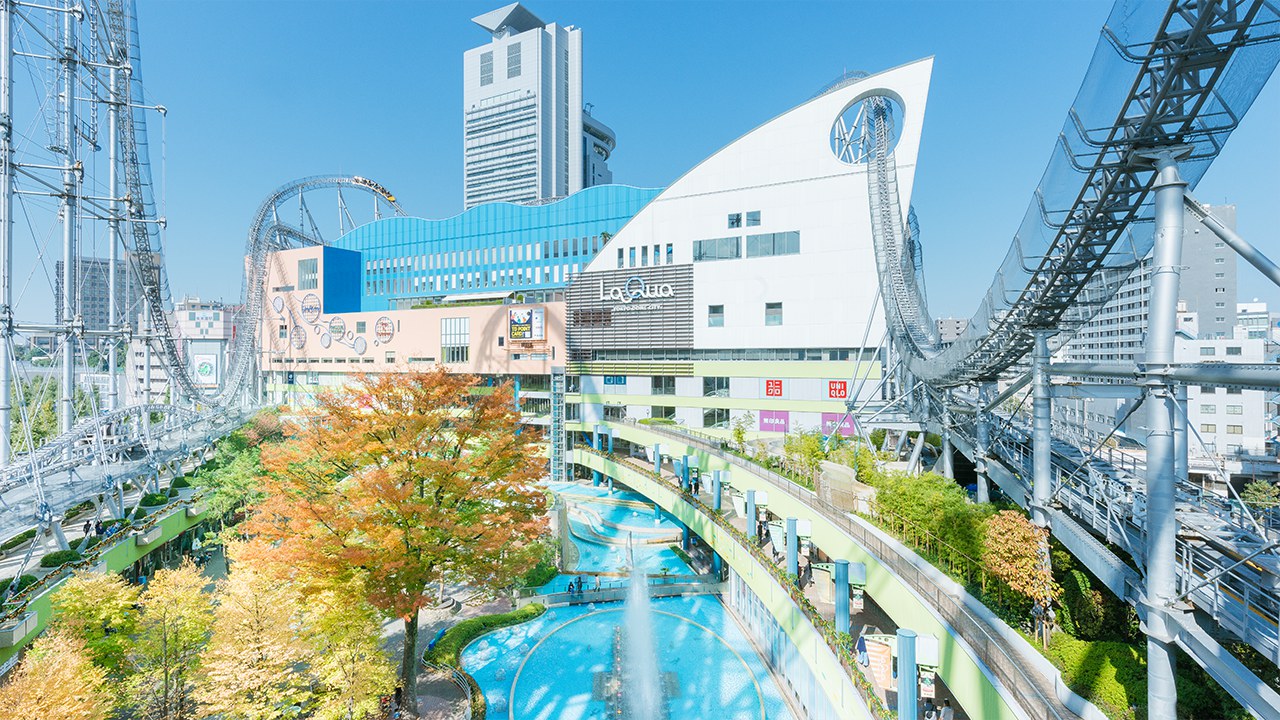Tokyo Dome City (東京ドームシティ) & Koishikawa Korakuen Garden (小石川後楽園) are two major tourist destinations located a short 15 minute walk from Coto Japanese Academy – they are also accessible via train – 1 stop away on both the JR Chuo line and the Tokyo Metro Namboku Line.

The dome from which Tokyo dome city gets its name is home to the Yomiuri Giants – one of Japan’s Puro Yakyū (プロ野球) or Professional Baseball teams in Japan’s NPB league (Nippon Pro Baseball).
The dome itself operates as a concert and sporting event venue year round – hosting everything from Professional Wrestling shows to J-Pop music concerts.
If you are interested in buying baseball tickets – we recommend to book them online in advance through a brokerage service as it is hard to find tickets at the box office on game day – especially when they are having a game against their biggest rivals the Osaka Hanshin Tigers.
 Tokyo L’Aqua Tokyo is a shopping and Onsen (温泉) Hot Spring complex that is part of Tokyo Dome city and contains 3 levels of shopping, restaurants, and rideable attractions. Nearby you can find everything from Batting Cages to Karaoke, as well as a Horse Track Betting Center.
Tokyo L’Aqua Tokyo is a shopping and Onsen (温泉) Hot Spring complex that is part of Tokyo Dome city and contains 3 levels of shopping, restaurants, and rideable attractions. Nearby you can find everything from Batting Cages to Karaoke, as well as a Horse Track Betting Center.
The L’Aqua Spa and is unique for being an authentic hotspring in Downtown Tokyo – because It sources its bathwater from a hotspring located 1,700 meters below ground. (That is a long way down to drill!)
It is also one of the most luxurious public baths in Tokyo and offers 3 floors of different baths, saunas, and amenities that will ensure a relaxing and entertaining afternoon or evening. If you are looking for a place to detox after a late night of bar hopping – they are open from 11:00 AM to 9:00 AM the following day.
With all of the variety – there is something for everyone here. Which makes it a must visit destination for anyone who would like a Japanese onsen experience without the pressure of a purely Japanese environment.

Nudity & Tattoos: Because this is a Japanese bath – you must be fully nude – swimsuits are not allowed. It is sex segregated and local regulars are used to seeing foreigners visit here – so even if it is your first time visiting a public bath – you have nothing to worry about.
The spa rules prohibit tattoos – there have been mixed reports of tattoos being okay (covered) and staff asking people to leave.
If you are feeling adventurous and want to risk it – Don Kihote or Donki for short which is located across the street sells tattoo covering kits for this very purpose.
Donkihote sells everything from electric bicycles to designer handbags, and has a grocery section that stocks many different types of Japanese sweets and drinks. Many people go here to stock up on Matcha flavored kit-kats.

This photo of Donkihote is courtesy of TripAdvisor
If you would like to ask for a tattoo covering kit you can say the following.
i.e. “すみません、タトゥーをカバーするためのテープ が ありますか?” – Sumimasen, tato~ū o kabā suru tame no tēpu ga arimasu ka?
Excuse me do you have tattoo foundation tape?

Between the amusement park, hotel, spa and the choice of internationally accessible restaurants (Shake Shack, Taco Bell, TGI Fridays, Bubba Gump Shrimp Company, Denny’s) – Tokyo Dome City is a go-to location for tourists staying in Tokyo.
The spa can be packed on weekends and during popular tourist seasons (Spring and Fall). If you are planning on visiting the spa during peak times – we would recommend dedicating the day to it – as it may take time to experience all that you would like to.
Across the street from all of the activity, noise and entertainment options is the peacefully serene 小石川後楽園 – an oasis that could not be more of a polar opposite of the high tech and industrious looking complex across the street.

Koishikawa Korakuen is one of three remaining daimyō (大名) gardens left in Tokyo. (Daimyo were fuedal lords that amassed power and military strength through hereditary land holdings and acted as prefectural kings. Dai (大) means “large”, and myō stands for myōden (名田), which means private land in Japanese.)
The name Korakuen comes from a Chinese Poem that encourages a ruler to only take pleasure for himself/herself after they have completed their duty of providing a good life for their people. The name could be loosely translated as – “The garden of delayed gratification”.
The construction of Korakuen was initiated by Mito Yorifusa in 1629, and completed by his son, Mito Mitsukuni (A member of the Tokagawa clan generally known for his prominent early influence in Edo era politics.)
Popular in both spring during cherry blossom season and fall because of the autumn foliage – it can get packed – so we recommend going early during peak seasons. There are several maple trees planted along the main water pond that turn vibrant shades of red and orange.

The garden is filled with several types of local wildlife – including impressively large koi and sun bathing turtles. It is a great location to wander around on a sunny spring day with a friend – enjoying casual conversation as you stroll along the sun bathed foliage of the garden.
Entry to the garden costs 300 Yen and opening hours are from 9:00 to 5:00 P.M. (17:00) with entry being cut off at 4:30 P.M. (16:30)
Coto Japanese Academy is a Japanese Language School located in Iidabashi – a 15 minute walk from both Tokyo Dome City & Koishikawa Korakuen. If you are interested in our Part-Time courses – please click the link below.